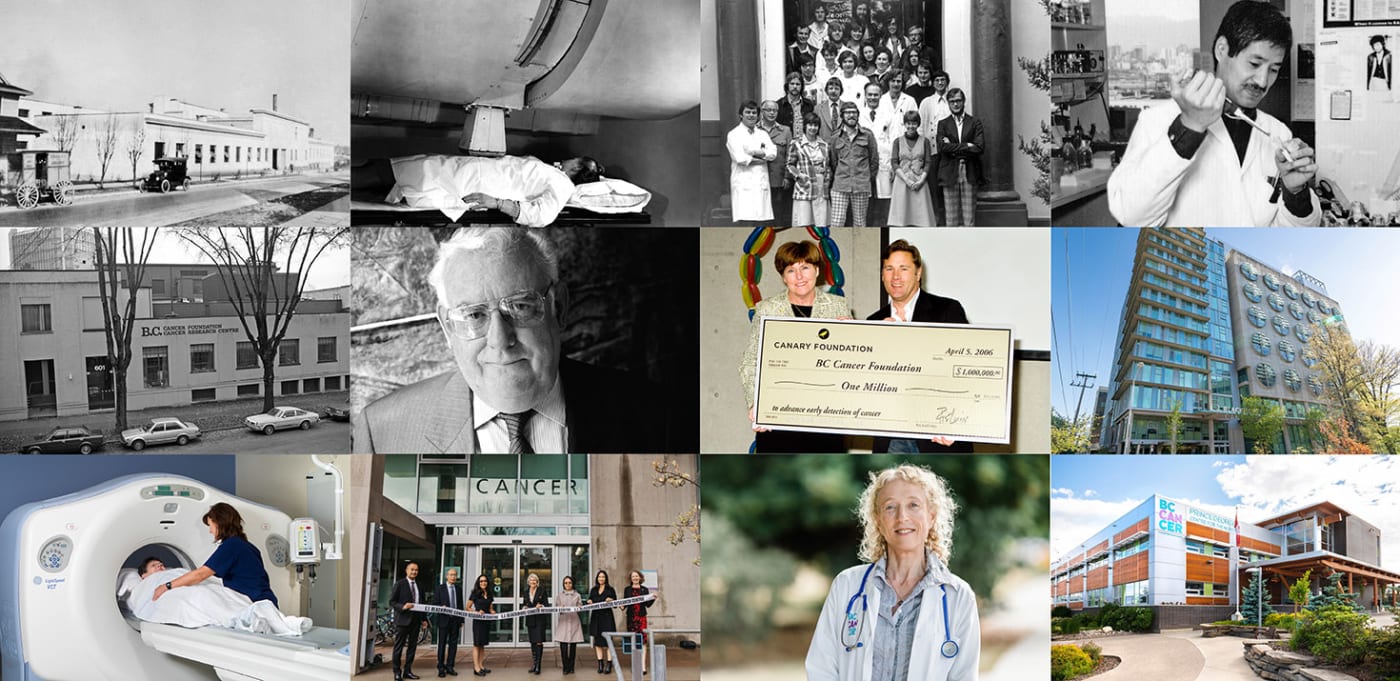
Interested in turning a pastime into a philanthropic event? Organize a fundraiser today!
Spring 2025 - 90th Anniversary Issue

The BC Cancer Foundation’s 90-year journey is a testament to what British Columbians can accomplish when we come together. From no organized cancer system in the 1930s to six world-class centres across B.C. — with four more in development — today.
Access to cutting-edge care and groundbreaking research in precision medicine, immunotherapies and gene-targeted treatments that were once unimaginable are now a reality. And B.C.’s life-saving screening programs have become models for other regions and countries to emulate.
At the heart of this progress is you, our donors — a community who believes that investing in the incredible talent at BC Cancer fuels optimism and saves lives.
I joined the Foundation as CEO in 2016, so while I’ve only witnessed a small slice of the 90 years of transformation, the trajectory of fundraising and impact in my time has been nothing short of awe inspiring — from $49 million to a record-setting $85 million in 2024. Every dollar of which stays right here in B.C.
In a time when supporting local has never felt more meaningful, investing in BC Cancer research is an opportunity to not only improve outcomes in our own backyard, for our families and friends who will face this disease, but to also advance global impact well beyond our borders.
As we look back in celebration on our 90-year history as an organization, our eyes ultimately return to face forward. Thank you for being such an important part of this journey, and I hope you will continue to join me in our shared commitment to achieve our vision of a world free from the fear of cancer.
![]()
Sarah Roth
President & CEO
BC Cancer Foundation
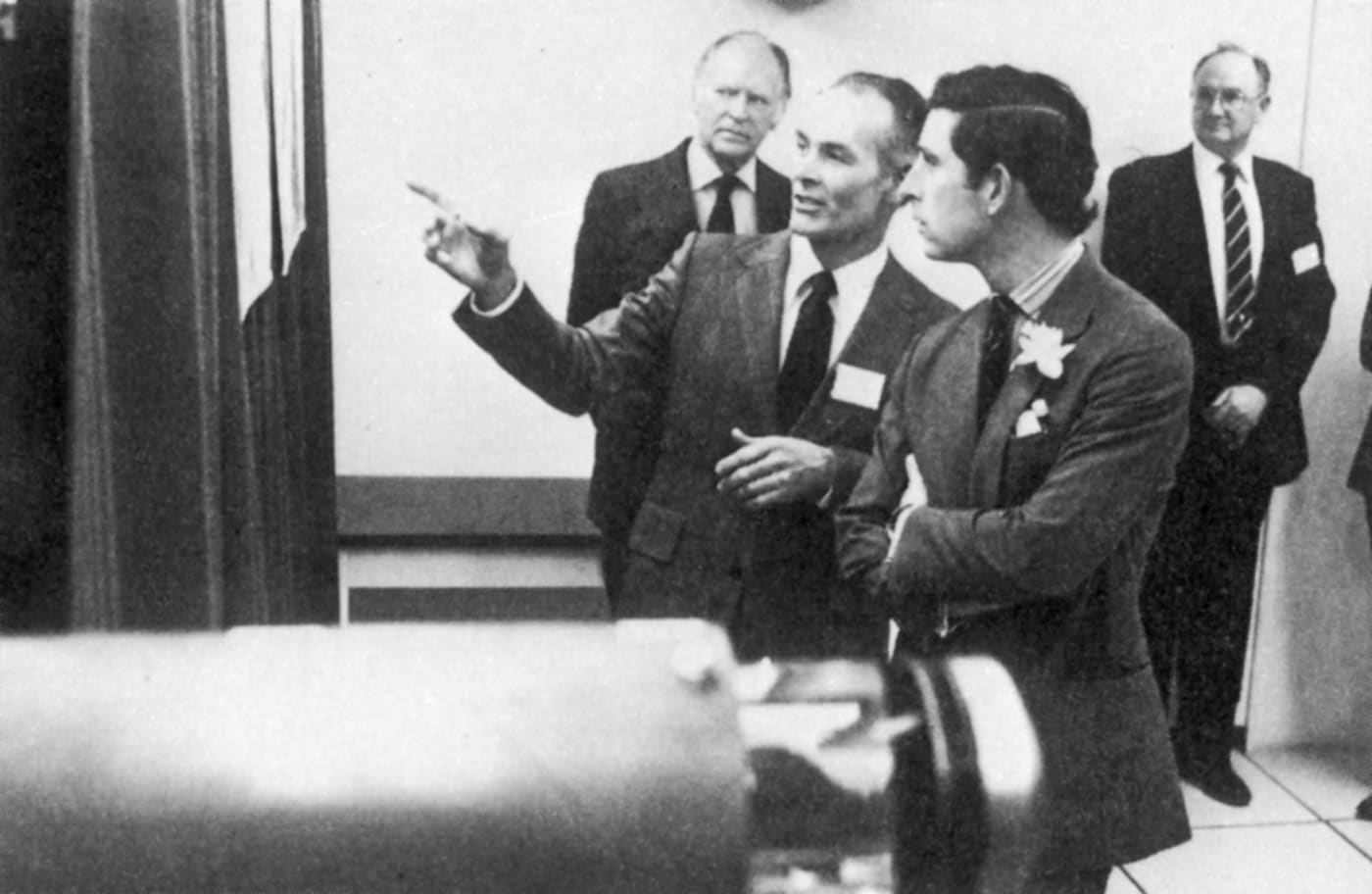
From a few individuals determined to do something about B.C.’s low cancer survival rates in the 1930s to the more than 80,000 people from across the province who give to cancer research and care today — since the very beginning, the BC Cancer Foundation has been driven by the collective power of community.

An anonymous $50,000 donation helped establish BC Cancer's first treatment centre in Vancouver in 1938.
In May 1935, a group of concerned citizens met at Hotel Vancouver to discuss a “pressing medical emergency,” — the fact that British Columbia had the worst cancer outcomes in the country. From that conversation, the BC Cancer Foundation was born and three weeks later received its first donation of $50.
The Foundation’s original board featured a lineup of influential British Columbians, including Malkin, Bell-Irving, Hamber, Pattullo, Shrum, VanDusen and Woodward — names that still hold prominence today. But it was the unwavering generosity of donors that truly drove change.
A $50,000 bequest by an anonymous woman helped transform a Vancouver hospital’s intern residence into B.C.’s first cancer treatment centre in 1938. Between 1948 and 1950, diagnostic clinics opened in Victoria, Penticton, Vernon, Kelowna, Kamloops, Nelson, Trail and Cranbrook.
In 1974, the provincial government took over cancer treatment and the BC Cancer Foundation deepened its focus on fundraising to support cancer research and care in B.C.
By 1985, 21 diagnostic clinics served patients across B.C. but the first regional cancer centre outside of Vancouver didn’t open until 1995 in Surrey. Fuelled by donor support, BC Cancer centres in Kelowna (1998), Victoria (2001), Abbotsford (2008) and Prince George (2012) followed.

Chris Ho and family.
Empowered by Beyond Belief, the most ambitious health campaign in provincial history to raise $500 million to transform cancer care in B.C., four more BC Cancer centres — in Burnaby, Nanaimo, Kamloops and a second in Surrey — are slated to open by 2030.
Since 1935, the BC Cancer Foundation has helped build a province-wide cancer control system that is a paragon of excellence worldwide. Donor support has expanded access to life-saving treatment, enabled state-of-the-art facilities, cutting-edge technology and a team of globally recognized experts, propelling BC Cancer — the only provincial cancer system in Canada — to the forefront of transformative cancer research and care.
Thanks to the vision of a few pioneers and the enduring generosity of the community, B.C. now boasts some of the best cancer outcomes in Canada — with more people living longer and healthier, enjoying added years with their loved ones.
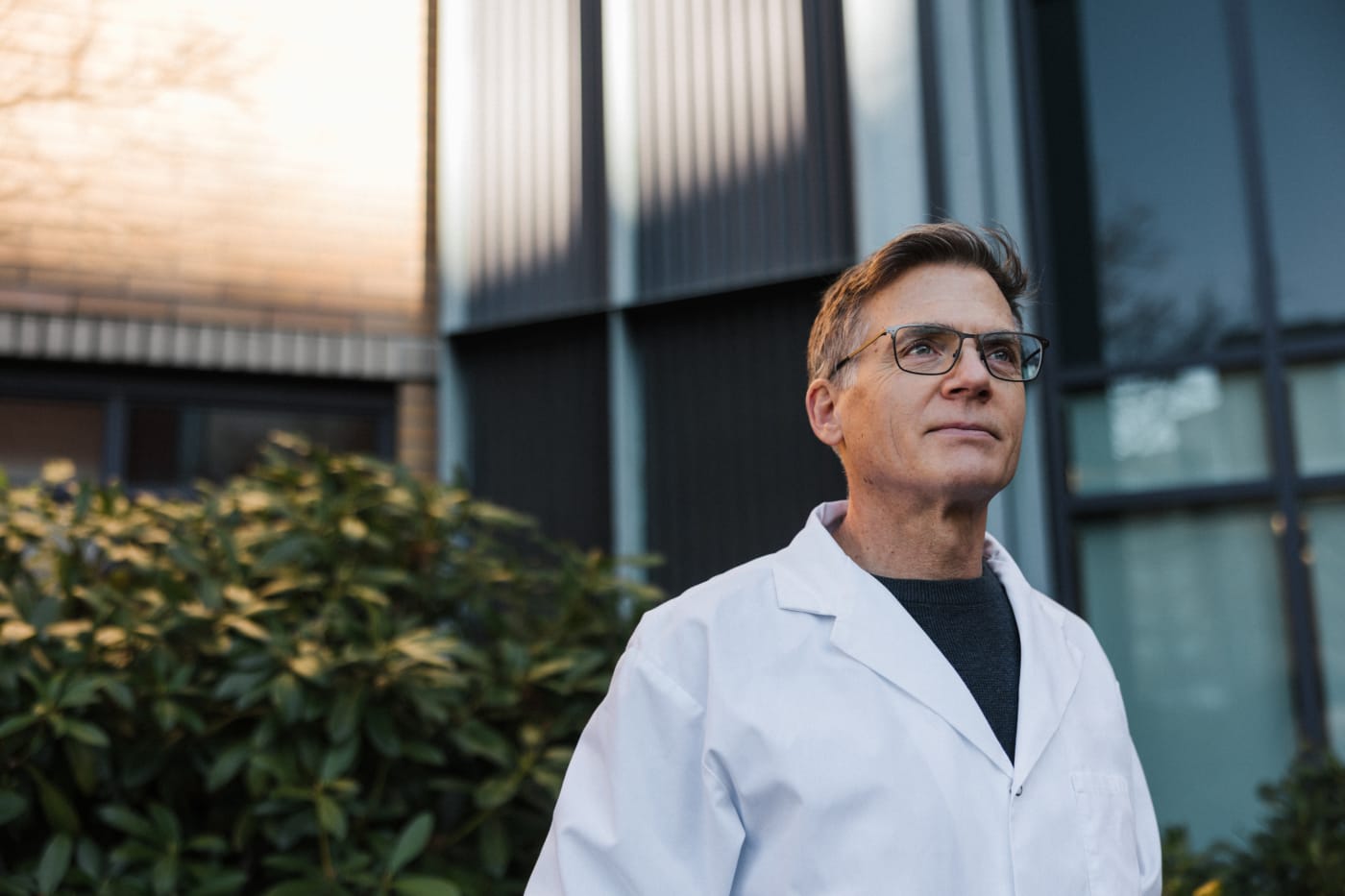
Dr. Brad Nelson
Bolstered by donors, bold steps taken in B.C can now be felt around the globe.
1949 — The first cytology lab opens in B.C. to detect early-stage cancer of the uterus, becoming an international model in early detection.
1967 — BC Cancer Foundation partially funds TRIUMF, the first lab in Canada to use proton beams on tumours, and now a major hub in nuclear physics, particle physics and medical isotopes.
1999 — BC Cancer’s Dr. Marianne Sadar’s breakthrough in hormone-resistant prostate cancer was celebrated globally — a discovery made possible by a Richmond charity golf tournament.
2010 — Discovered by BC Cancer’s Dr. Dianne Miller, and now utilized world-wide, opportunistic salpingectomy becomes an effective preventative measure against ovarian cancer.
2012 — BC Cancer’s flagship study in precision medicine is the first in the world to deploy whole genome analysis to inform individual treatment planning.
2017 — Researchers at BC Cancer identify seven new ovarian cancer subtypes, a discovery which is informing novel treatments including options for chemotherapy-resistant disease.
2024 — A drug that could stop the deadly spread of osteosarcoma, the most common bone cancer in children (the disease that claimed the life of Terry Fox), is discovered by BC Cancer scientists.
2025 — BC Cancer launches a new clinical trial for made-in-B.C. immunotherapy for blood cancers, paving the way for expanded treatment access.

Elizabeth Laugharne has donated to the BC Cancer Foundation for 30 years.
Long-time donors to the BC Cancer Foundation are driven by a deep commitment to give in ways that are meaningful to themselves and their families — financially, but also by investing their time and energy to rally their communities to make a difference in the lives of people facing cancer.
“Fundraising to advance cancer care in B.C. opened up a whole new part of my life,” says Elizabeth Laugharne. At 101 years old, Elizabeth has been a monthly donor since 1995 — making her one of the Foundation’s most consistent, and possibly most senior, donors.
After a career in nursing, she retired in Victoria and was as surprised as anyone when, in her 70s, she began a whole new chapter in life as chair of the building committee for BC Cancer – Victoria.
During her eight decades in health care, Elizabeth has seen significant change. She was only 11 in 1935 when the BC Cancer Foundation was founded — but she does remember prior to 2001 when cancer treatment on the Island was “trying to function in spare rooms in the hospital.”
“It was a major challenge to provide for patients and retain specialists who were working in impossible situations,” she says.
A cancer survivor who has lost loved ones to the disease, Elizabeth says of all the ways she’s helped fuel cancer care in B.C., her 30-year commitment of small monthly donations is the most rewarding. “Researchers and patients depend on the steady, reliable support of people like me.”
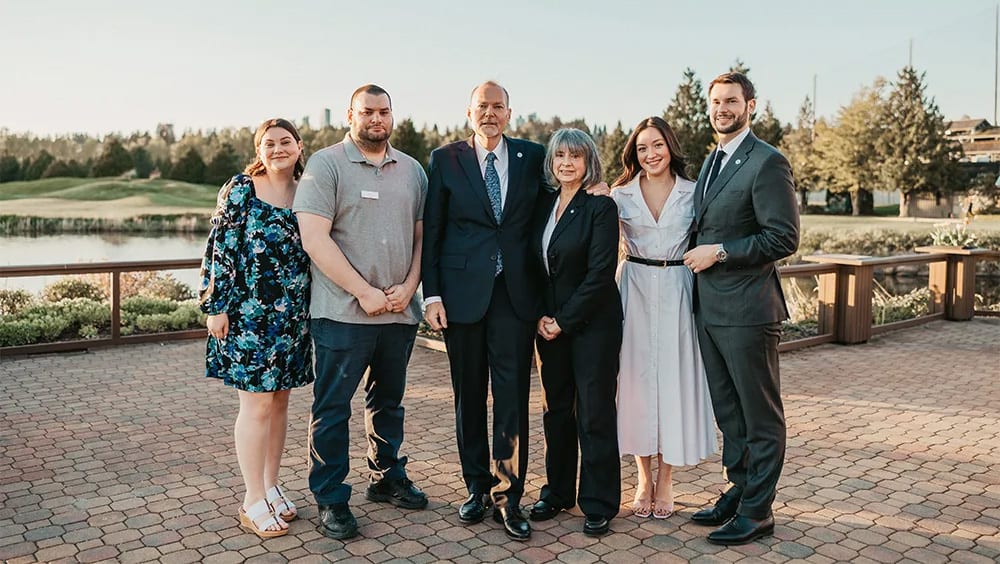
McCarthy family.
“Work hard, live well and give back,” says Bill McCarthy of the ethos his grandfather John Jambor — a Slovak immigrant who spent his life paying it forward in appreciation of Canada’s opportunities — has instilled in four generations of the McCarthy family.
Since 1970, their support has included an educational fund to empower BC Cancer researchers, a transformational charitable bequest and Bill’s son John McCarthy’s dedicated leadership as the youngest board chair in BC Cancer Foundation history. All with a vision of giving back to the community by bringing cancer care closer to home — a goal they helped realize in 2024 when they invested in the BC Cancer – Burnaby McCarthy Centre.
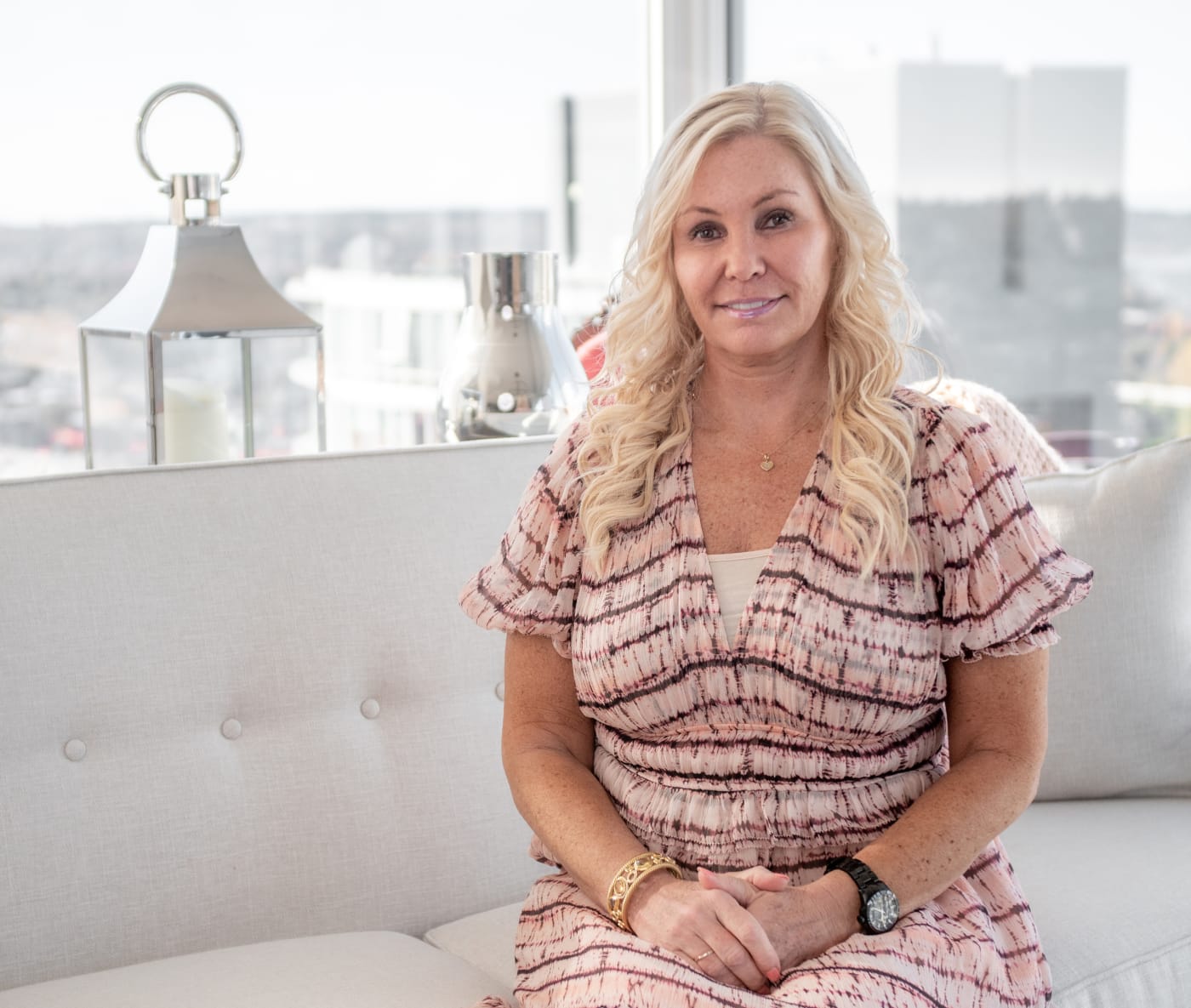
Laurie Rix
“BC Cancer had the technology, progressive thinking and willingness to take the leap into precision medicine,” says Laurie Rix on her father Dr. Don Rix’s refusal to accept standard care for his rare cancer, which pushed his B.C. oncologists to become the first in the world to use genomic sequencing to inform treatment in 2010.
Laurie was impacted by cancer again when her husband, broadcaster Neil Macrae, was diagnosed with breast cancer and genetic analysis uncovered a BRCA mutation that increased his risk. In 2020, in addition to raising awareness of breast cancer in men, the Rix Family Foundation generously invested in BC Cancer research into rare and hard-to-treat forms of the disease.

Lauri Glotman (née Diamond), Gordon, Leslie and Jill Diamond
“It’s for our daughters, for everyone’s daughters,” says Jill Diamond and Lauri Glotman on their family’s generous investment in BC Cancer’s Hereditary Cancer Program, to arm more women and their families with the knowledge about their increased risk of cancer and the preventative measures they can take, which culminated in the opening of the Diamond Foundation Hereditary Cancer Centre in 2025.
In advancing cancer research in B.C., the Diamond family’s roots run deep — to the very land the L.J. Blackmore Cancer Research Centre stands on as Gordon Diamond gifted the plot to BC Cancer in 1997.

Alex Campbell — founder of Thrifty Foods
“Supporting the BC Cancer Foundation has always been a way for our family to touch the lives of as many people on Vancouver Island as possible,” says Lorne Campbell whose late father Alex Campbell — founder of Thrifty Foods — believed with success came an obligation to give back.
The Campbell family’s commitment to improving cancer care for Islanders began in 2001 when Alex chaired the Daring to Believe campaign that founded BC Cancer – Victoria. A decade later, Alex and his wife, Jo, led fundraising for its expansion, and today their children, Bonnie, Lorne and Alex Jr., continue the legacy by supporting a new space for BC Cancer’s supportive care programs.

The Capilano Cypress Challenge presented by Glotman•Simpson Cycling.
BC Cancer Foundation’s long-running events have seen thousands of dedicated participants challenge themselves to overcome physical obstacles to inspire their communities to give. Beyond fundraising, they’re a celebration of resilience and relentless determination in honour of loved ones lost and friends and family courageously facing cancer.
Over the past 16 unforgettable years of the Tour de Cure, everyone who participated, fundraised, volunteered or cheered on riders contributed to not only raising millions of dollars, but to something even more powerful: hope for a future free from the fear of cancer.
In 2008, a handful of people pedalled 12 km up the mountain in the Capilano Cypress Challenge presented by Glotman•Simpson Cycling. In 2024, 600 riders made the climb for pancreatic cancer.
Since 2017, almost 13,000 participants have exercised for 30 minutes every day in May in the month-long Workout to Conquer Cancer. That’s 11 million minutes of moving for more cures!
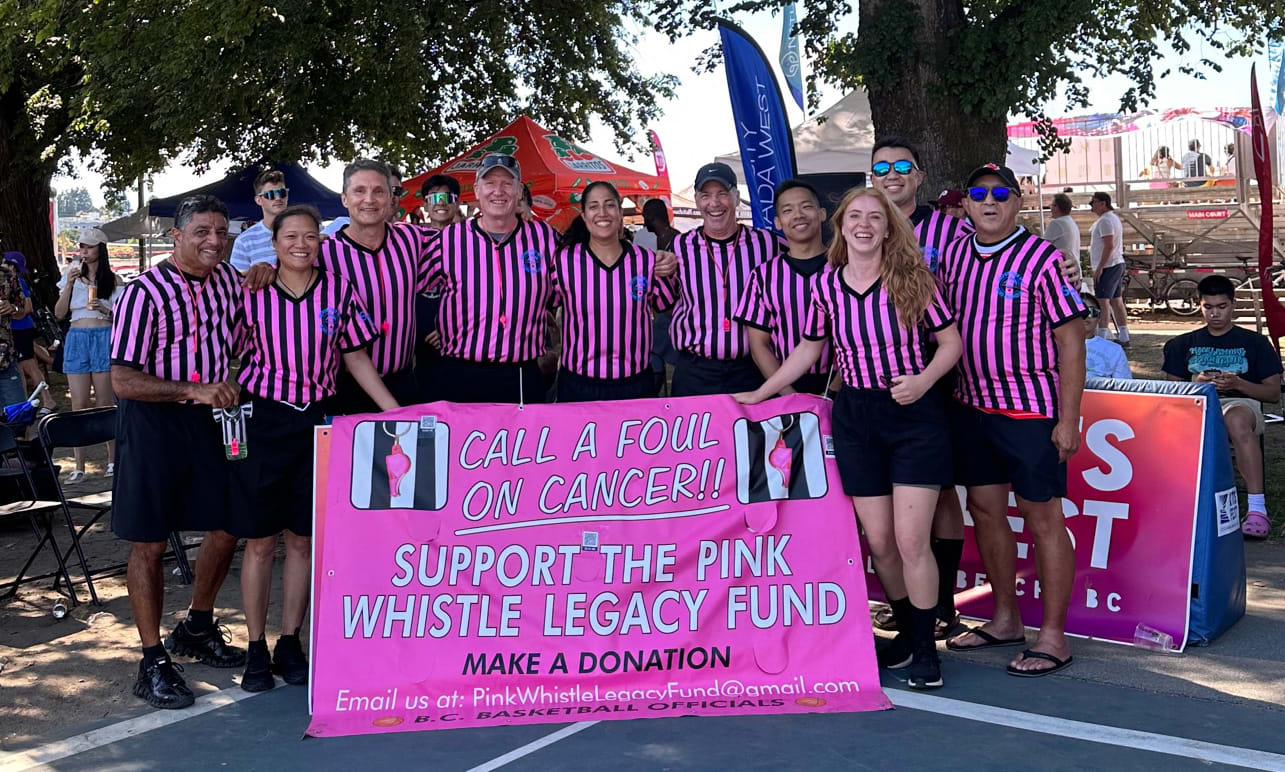
Karn Dhillon (far left) leads a team of B.C. basketball officials who have raised more than $250,000 for the BC Cancer Foundation.
From bagpipes to basketball, the creativity in which community fundraising events combine personal passions with purpose is truly inspiring.
Golf tournaments in the Okanagan and in Richmond have been supporting BC Cancer in their communities for more than 20 years. Other well-established annual events drive donations in unique and engaging ways including a stick-fighting martial arts event, a four-wheel drive weekend, a 40-hour live stream event and even a David Bowie tribute concert.
Interested in turning a pastime into a philanthropic event? Organize a fundraiser today!
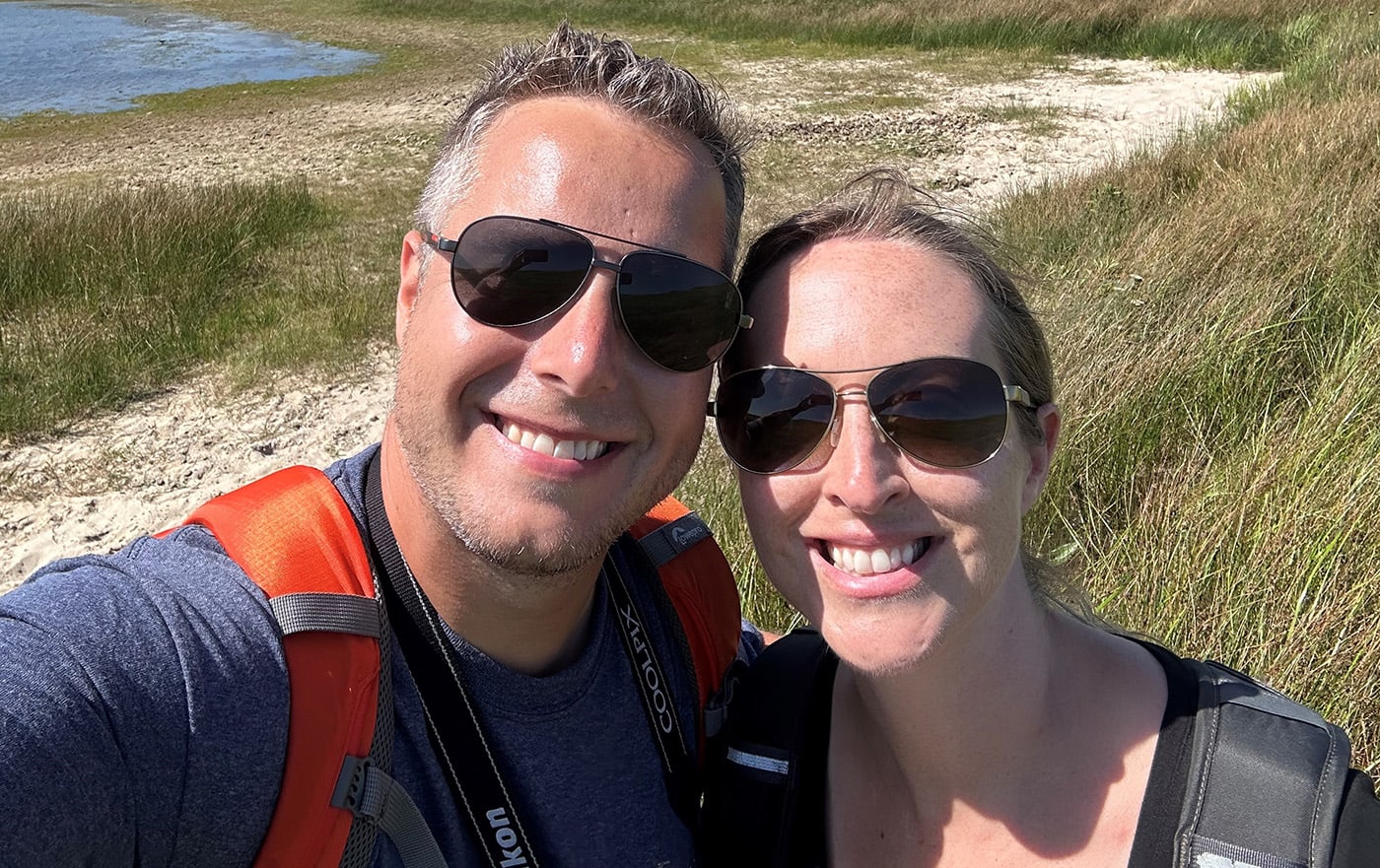
Valerie and her husband, Matthew.
“I’ve had this great weight lifted off my shoulders. I have a dramatically reduced risk of cancer going forward.”
When Valerie Heyman discovered she carried a gene mutation that increased her risk of cancer she didn’t feel devastated — she felt empowered. Genetic testing and counselling at BC Cancer enabled her to step out from the shadowy past of a family history of disease and into a bright future armed with the knowledge of preventive action.
“I’m just so grateful,” says the 40-year-old health care worker from Vernon who first learned of the BRCA1 gene mutation in her family 20 years ago from an aunt who faced breast and ovarian cancer.
The average woman in B.C. has a 12% risk of breast cancer and a 2% risk of ovarian cancer. For BRCA mutation carriers these statistics soar to a 70% chance of developing breast cancer by age 70, and a 50% chance of developing ovarian cancer.
After testing positive five years ago, Valerie planned for a double mastectomy and oophorectomy (removal of the ovaries). Until then, she was being monitored closely. When a test showed early cancer cells in her left breast, a mastectomy in March 2024 caught it just in time.
“I’ve had this great weight lifted off my shoulders. I have a dramatically reduced risk of cancer going forward,” — which will be minimized even further after a surgery this year to remove her ovaries.
When Valerie unexpectedly lost her dad in a car accident, it prompted her to look at her own legacy. She’s chosen to leave a portion of her assets in her will to the BC Cancer Foundation in support of BC Cancer’s Hereditary Cancer Program.
“I want to help ensure they reach more people and develop new ways to support those at risk of hereditary cancers. I want others to have the same chance I did.”
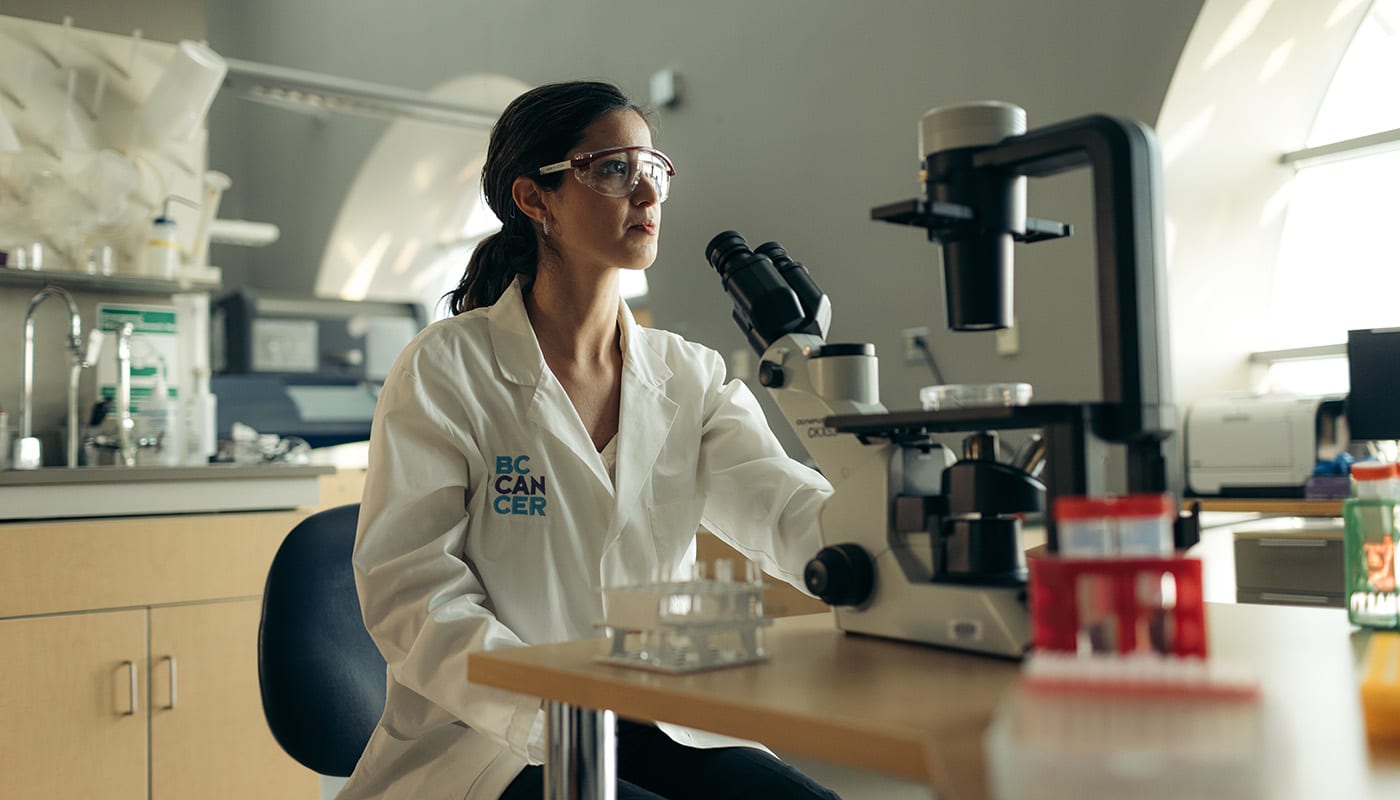
Dr. Lily Proctor
From pioneering screening programs to world practice-changing discoveries, BC Cancer Foundation donor support has revolutionized care in three common cancers.
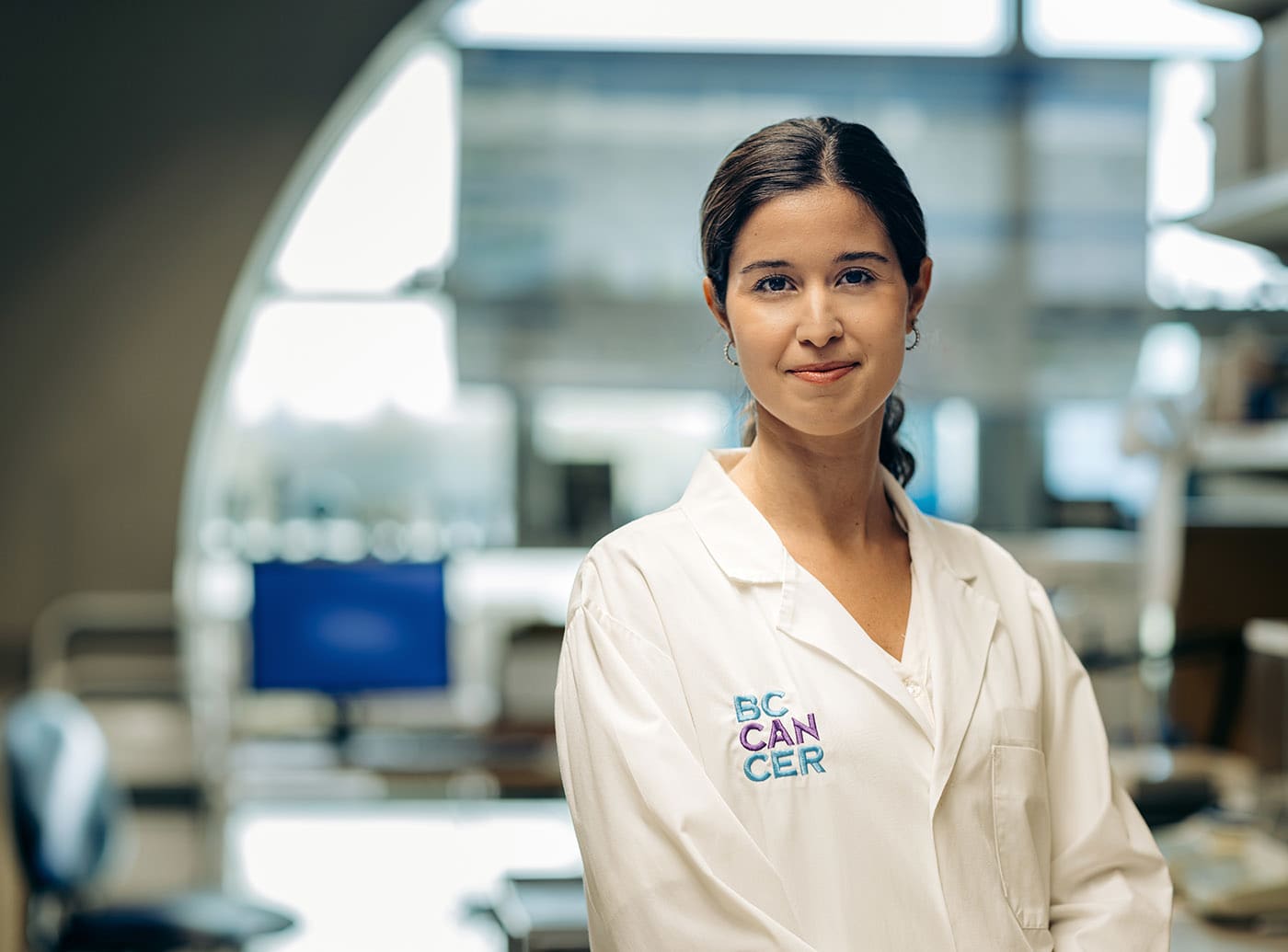
Dr. Lily Proctor
Prior to the 1950s, cervical cancer was a major cause of death. Today, thanks to new innovative BC Cancer testing, it’s on track to disappear within two decades.
Past: In 1955, BC Cancer established the first cervical cancer screening program in the world, leading to a more than 70% decrease in incidence and mortality of cervical cancer.
Present: In 2024, led by Dr. Lily Proctor, BC Cancer launched Canada’s first cervix self-screening option. Informed by a BC Cancer Foundation-funded program investigating how to improve screening uptake in the Fraser Valley’s South Asian community, the self-swab kit offers women the choice to test at home for the human papillomavirus (HPV), the leading cause of cervical cancer.
Future: BC Cancer’s self-screening option is a giant leap forward in the global strategy of eliminating the disease by 2040. A more accessible, equitable test, it increases coverage by 20% in low-income, rural and remote communities, and in new immigrants, First Nations, Inuit and Métis — who, due to barriers to care, experience higher cases of cervical cancer.
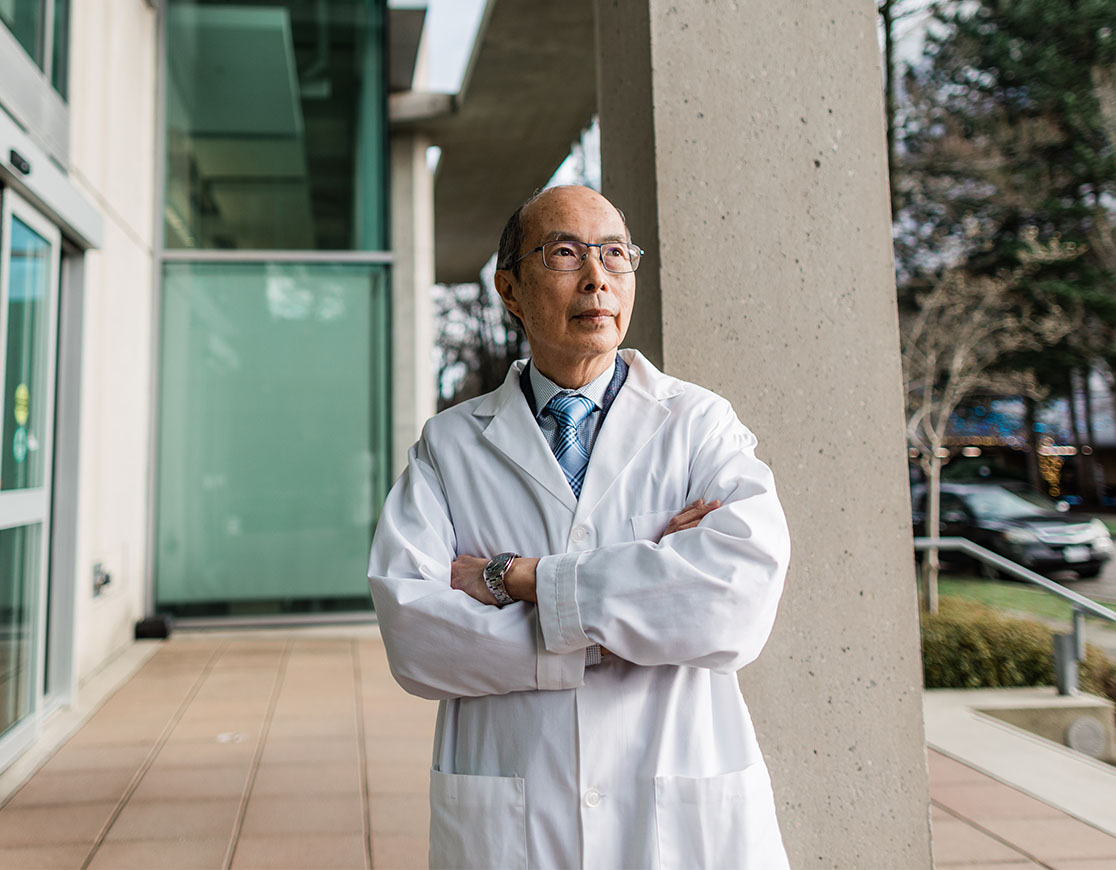
Dr. Stephen Lam
Long thought of as solely a smoker’s disease, donor investment in BC Cancer research is helping reduce stigma and advance early detection for all high-risk individuals.
Past: In 2010, BC Cancer discovered that lung cancer in non-smokers (which accounts for 30% of cases in B.C.) is a completely different disease, prompting alternate diagnostics and treatments.
Present: In 2022, fuelled by almost $2 million in donor support, B.C. implemented Canada’s first provincial lung cancer screening program for eligible, high-risk individuals (people age 55-74, who have smoked for 20 years). It has since detected 74% of participants’ lung cancers at an earlier, more treatable stage.
Future: BC Cancer’s Breathomics Lab is harnessing artificial intelligence (AI) to develop a novel test which identifies chemical signatures in breath to detect early lung cancer and provide insight into how changes in the lung microbiome may indicate lung cancer development in non-smokers.
After discovering Asian women are more susceptible to lung cancer caused by air pollution, BC Cancer’s Dr. Stephen Lam is pursuing research into how genetics and environment affect risk to uncover new interventions for at-risk patients.

Dr. Sam Aparicio
A global leader in breast cancer research, BC Cancer discoveries have changed the way the world diagnoses and treats the disease.
Past: In 1988, BC Cancer established Canada’s first screening mammography program, reducing breast cancer incidences in B.C. by 25%.
In 2005, donor funding brought renowned U.K. scientist Dr. Sam Aparicio to lead BC Cancer’s breast cancer research program. His team’s subsequent breakthroughs include the genetic decoding of triple negative breast cancer (TNBC) — an aggressive form which accounts for 25% of all breast cancer deaths — and reclassifying breast cancer into 10 different subtypes. These transformational discoveries acted as a springboard in developing new targeted drugs and treatments tailored to individual patients.
Present: Thanks to donor-fuelled advances, the survival rate for early-stage breast cancer in B.C. is 92%. A recent BC Cancer discovery of cancer-like mutations in healthy breast cells could pinpoint the early genetic origins of breast cancer, leading to a new understanding of risk and improved detection and prevention strategies. Preliminary findings from a donor-supported study examining circulating tumour DNA (ctDNA) in the bloodstream of TNBC patients are proving highly effective in detecting relapse up to two years before it occurs.
Future: With donor support, BC Cancer is launching genetic testing for all breast cancer patients under 60. Enhanced identification of individuals with BRCA gene mutations — which can increase the risk of developing breast cancer to 70% — is lifesaving for families impacted by the disease.
Learn more about how donors are advancing cancer research and care in B.C.
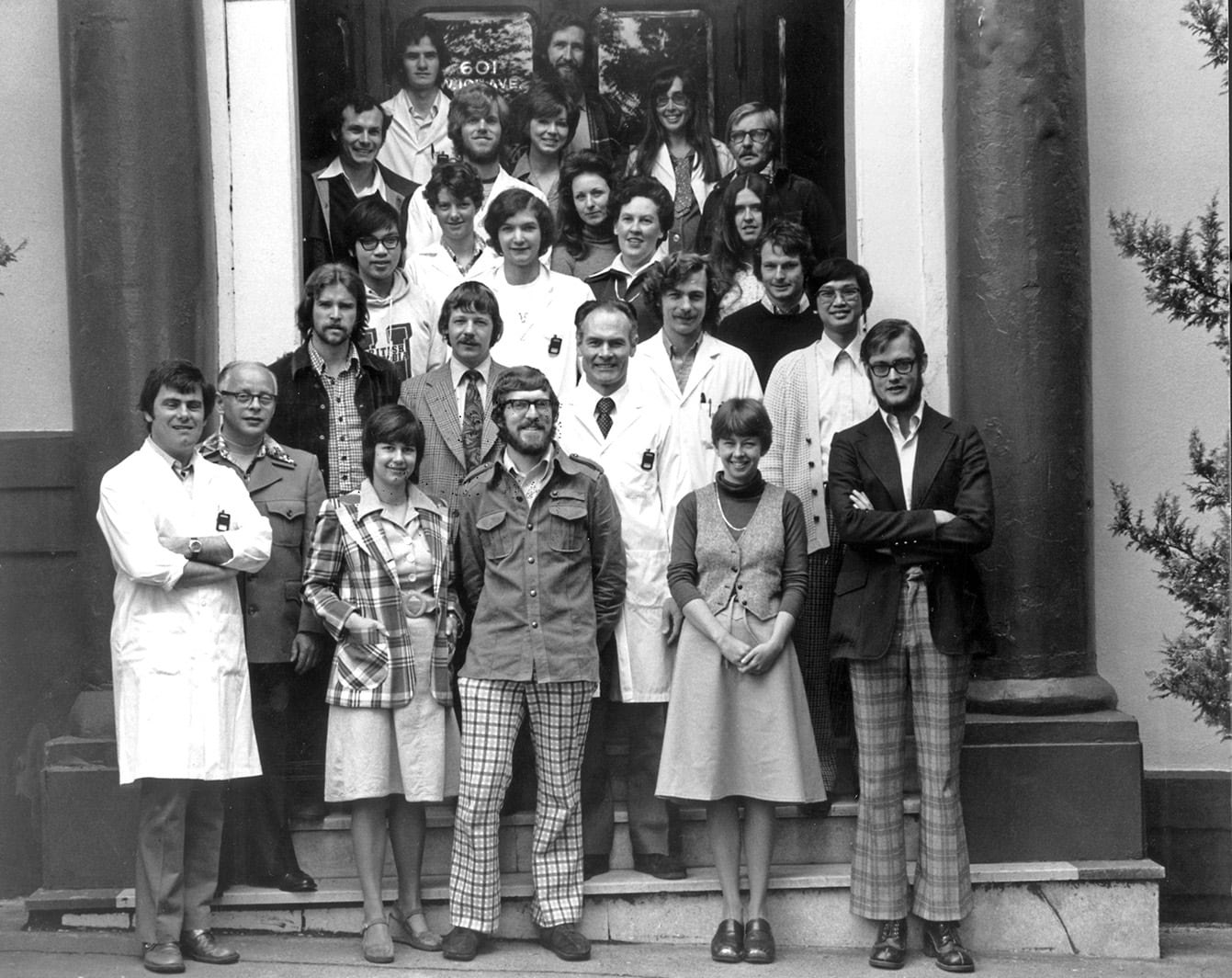
BC Cancer Research Centre staff in 1976
Cancer research in B.C. was being conducted earlier, but it gained a dedicated home in 1972 when the BC Cancer Foundation bought McGavin’s Bakery in Vancouver. Devoted researchers such as Dr. Connie Eaves set up shop in the dusty, former bakery prior to its renovation and opening as the BC Cancer Research Centre in 1979 — when the first patients received treatment in clinical trials.
In 1997, the Foundation launched a $100 million Millennium campaign to support the building of new research centres in Vancouver and Victoria and a genome science centre to be led by Nobel laureate Dr. Michael Smith. One of the first to donate was the Diamond family, through a gift of the property that the L.J. Blackmore Cancer Research Centre in Vancouver (opened in 2005) now stands on.
In 2001, the Daring to Believe campaign raised $6.4 million to create research space in the new BC Cancer – Victoria. In honour of Trev and Joyce Deeley’s commitment to advancing research on the Island, the fully donor-funded building was named the Deeley Research Centre (DRC) in 2003.
A world-leader in immunotherapy research, treatment that harnesses the immune system to attack and destroy cancer, the DRC is home to BC Cancer’s donor-supported Tumour Tissue Repository — hundreds of thousands of patient samples crucial in enabling BC Cancer’s pioneering research.
The DRC’s Conconi Family Immunotherapy Lab, established through donor support in 2016, is driving innovation in CAR T-cell therapy and was the first in Canada to produce CAR T cells, genetically engineered cancer-fighting copies of a patient’s own immune cells.
In just over a decade, BC Cancer – Prince George has become a globally recognized hub for precision radiation research. And thanks to BC Cancer’s provincial structure, collaborative life-saving clinical trials are currently serving patients at all six regional cancer centres.
Learn more about cutting-edge research in B.C.
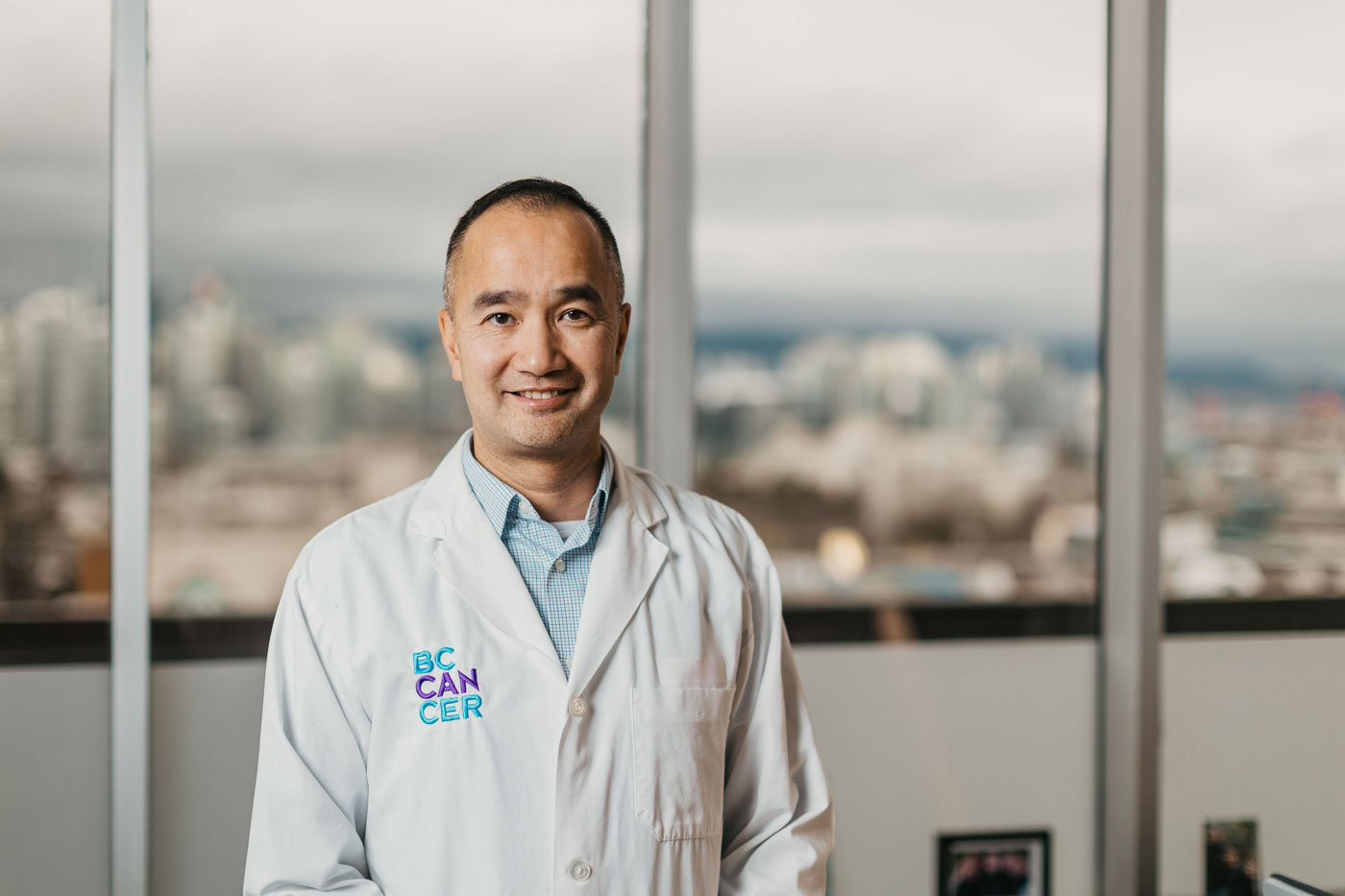
BC Cancer Executive Vice President and Chief Medical Officer Dr. Kim Chi
From a fellowship in the late ’90s to his current role as the Executive Vice President and Chief Medical Officer, Dr. Kim Chi reflects on more than 25 years at BC Cancer.

What has kept you in B.C. for over two decades?
BC Cancer is unique, in Canada and in the world, due to our provincial structure which enables collaboration and consistency in care across B.C. As a researcher, this is invaluable as it offers a much wider, population-level of data, from diverse demographics and regions that reflect a range of cancer types, treatment responses and patient outcomes, to help develop more personalized treatments.
And, of course, our work is backed by a donor community like no other. Without BC Cancer Foundation support, we would not be the world-leading cancer organization we are today.
As a leader in prostate cancer research — involved in almost every major drug to treat the disease over the past 20 years — what BC Cancer-led innovations are providing new hope?
We’ve entered an exciting era of precision medicine over the past decade — which has doubled life expectancy for prostate cancer patients in B.C. Donor-supported advancements include:
Cancer cases are on the rise, what keeps you going in the race to stay ahead of this disease?
We are curing more people, and more people are living longer and better with cancer than ever before. This is thanks to research and innovative new treatments — much of it led right here in B.C. While it’s a privilege to be at the helm of our provincial cancer system, I also really appreciate helping patients on an individual level where I get to see our work in action every day.
How has donor-supported research impacted patients over your career?
Recently, I had to tell a long-time patient that we no longer had any treatment for his cancer and that he had weeks, maybe months to live. But, behind this incredibly difficult conversation is a growing success story. Twenty years ago, when I had first started in oncology, I would have had one treatment to offer him — a chemotherapy that was not very effective. His prognosis would have been grim: one year.
Instead, thanks to research he had five treatments: targeted therapy, more effective chemotherapy immunotherapy, and radioligand therapy, as well as genomic and molecular characterization of his cancer that enabled us to tailor his treatment. As a result, he had seven good years with his family.
What promising new treatments are on the horizon?
Immunotherapy — harnessing a patient’s own immune system to fight cancer — has revolutionized cancer treatment but there is much more work to be done. Founded fully through donor support, the immunotherapy research program at BC Cancer’s Deeley Research Centre (DRC) was the first in Canada to manufacture CAR T cells, white blood cells genetically engineered in the lab to identify and destroy cancer.
A clinical trial using the made-in-B.C. CAR T cells is showing complete regression in 43% of its participants — leukemia and lymphoma patients who had exhausted all other treatment options. BC Cancer experts are preparing to research the effectiveness of CAR T-cell therapy to treat some of the most challenging cancers, including ovarian and pancreatic.
Can you give an example of when you’ve seen a project go from lab to life-saving treatment?
I had a patient who benefited from a diagnostic we created right here at BC Cancer – Vancouver, supported by BC Cancer Foundation funds. Instead of a biopsy or surgery to remove tissue for evaluation, we developed a blood test that screens for genomic markers in prostate cancer patients. In this individual, the blood test identified a gene mutation that responds well to immunotherapy.
What’s incredible is this mutation only occurs in about 3% of prostate cancer patients and it’s difficult to find. Thanks to this simple blood test, however, we located it and enrolled him in an immunotherapy clinical trial. He’d already received multiple treatments including surgery, radiation and chemotherapy, and yet his cancer had spread. After immunotherapy he achieved a complete response and four years later, he is free from disease. At just 72 years old, he is now enjoying many more years with his grandson.

Donor support has enabled access to life-saving PET/CT imaging across B.C.
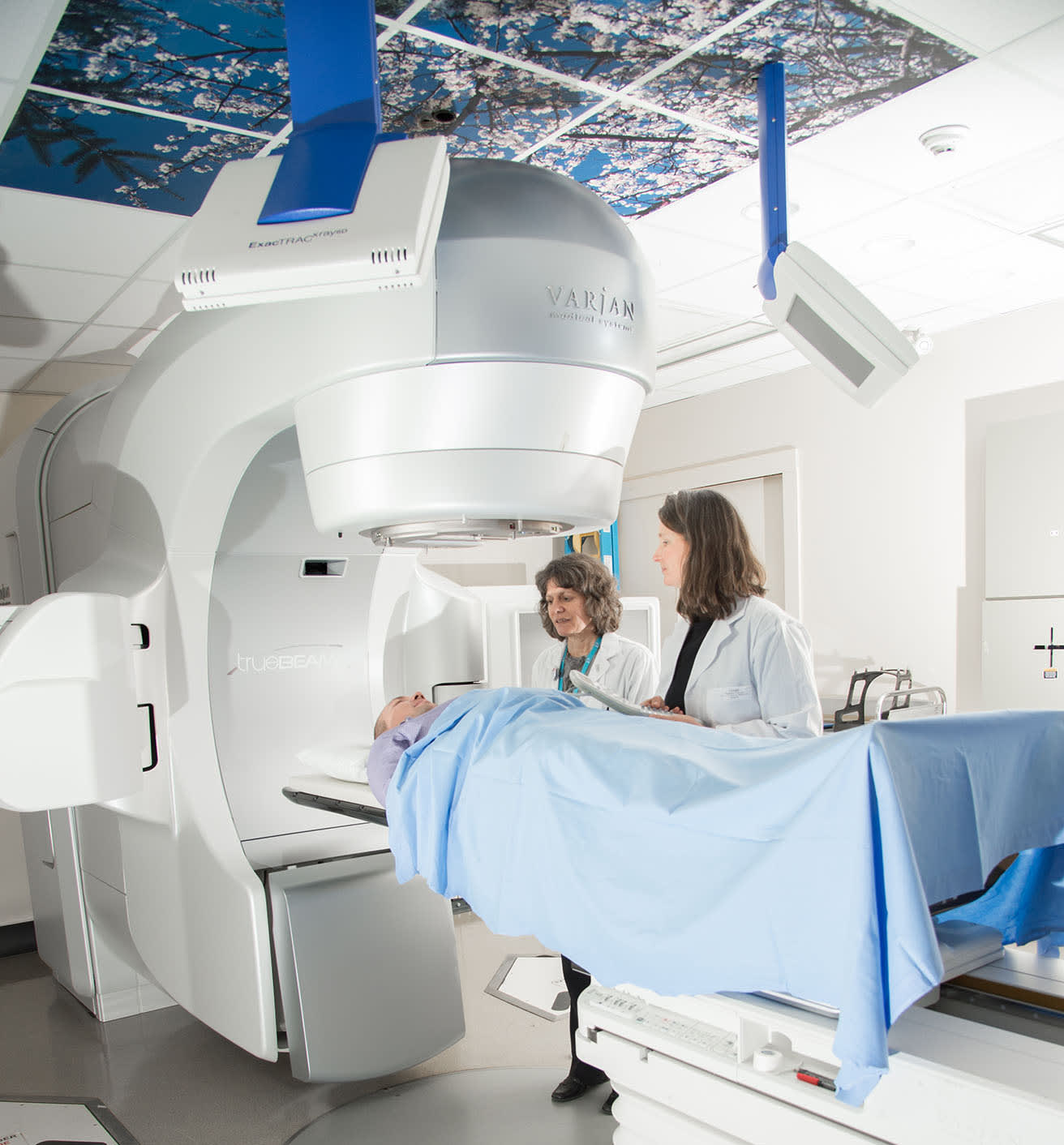
Half of all cancer patients in B.C. require radiation therapy.
From the rudimentary use of unprocessed radium to the AI-informed precise beams and internally placed “seeds” of today, donor-supported radiation therapy research is advancing access and care for the more than 50% of all cancer patients in B.C. who require the treatment.
Past: In the 1930s, an anonymous donor helped purchase one of the first grams of rare radium, launching radiotherapy in B.C. While effective in killing cancer cells, early radiation treatments were imprecise and impacted healthy tissue along with the tumour causing unintended damage.
Present: B.C.-led innovation in precision radiation therapy has significantly improved treatment, targeting the tumour within millimetres to reduce harmful side effects and increase access across the province.
In 2009, donors enabled BC Cancer – Kelowna to bring brachytherapy — placing radioactive sources or “seeds” in the tumour to kill cancer cells, limiting toxicity and reducing treatments from weeks to just days — to the Interior. In 2020, fundraising helped recruit B.C.’s first Chair in Brachytherapy, Dr. Juanita Crook, who is leading world-class research in brachytherapy to treat prostate and breast cancer.
Future: Donors are putting BC Cancer at the forefront of pioneering research in stereotactic ablative radiotherapy (SABR), a highly focused, high-dose radiation therapy that minimizes side effects and can be delivered in just five treatments — compared to 30-35 traditional radiation sessions. A joint BC Cancer – Victoria and Surrey trial is using AI to further reduce SABR treatments to just two doses.
Since radiation therapy is only available at BC Cancer, as SABR progresses to become standard of care in treating more cancers it will greatly increase capacity at B.C.’s six regional centres. The development of four more BC Cancer centres (Burnaby, Surrey, Kamloops and Nanaimo) will further increase access to the nearly 167,000 radiation sessions B.C. patients require each year.

Computer-positioned radiation treatment in 1979.
Essential imaging in the diagnosis, treatment and management of cancer, PET/CT technology has undergone an incredible transformation, in terms of efficiency, precision and access across B.C., thanks to donor investment over the past 20 years.
Past: B.C.’s first publicly funded PET/CT scanner began operating in Vancouver in 2005. The BC Cancer Foundation provided $3.2 million to purchase a second scanner, as well as upgrade the first machine, in 2011 — doubling capacity from 3,100 scans to 6,200 scans a year.
Present: Donor support helped replace BC Cancer – Vancouver’s aging PET/CT with a new state-of-the-art machine in 2019. Around the same time, communities in Vancouver Island and the Interior rallied to raise $5 million each to bring PET/CT technology to Victoria and Kelowna — saving nearly 3,000 patients a year from having to travel to Vancouver to receive the life-saving scans.
Future: A donor-supported Next Gen PET/CT, the gold standard in cancer imaging and the first in the country, will begin operating in Vancouver in 2025. Twenty times faster and more sensitive than the current PET/CT technology, it reduces scan time from 40 minutes to just two minutes, while offering unprecedented data that increases the opportunity for early detection, identifies smaller cancer sites and accurately measures a drug’s efficacy over time. In addition to improving capacity across the province, it will also advance research on new radioactive drugs to treat cancer.
Donate today to support BC Cancer – Vancouver’s Technology Transformation (a suite of best-in-class diagnostic, radiation and imaging equipment, including the Next-Gen PET/CT).